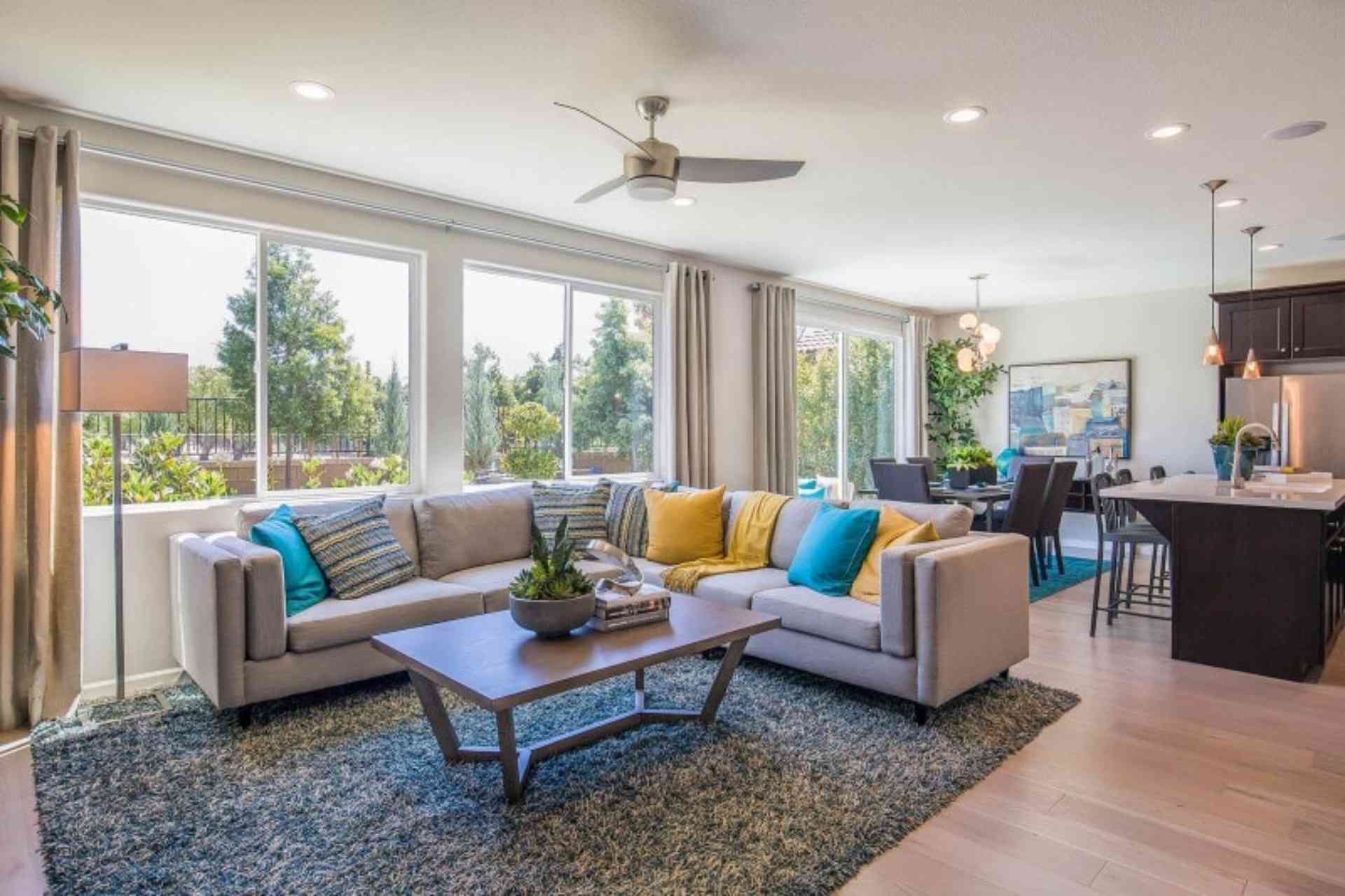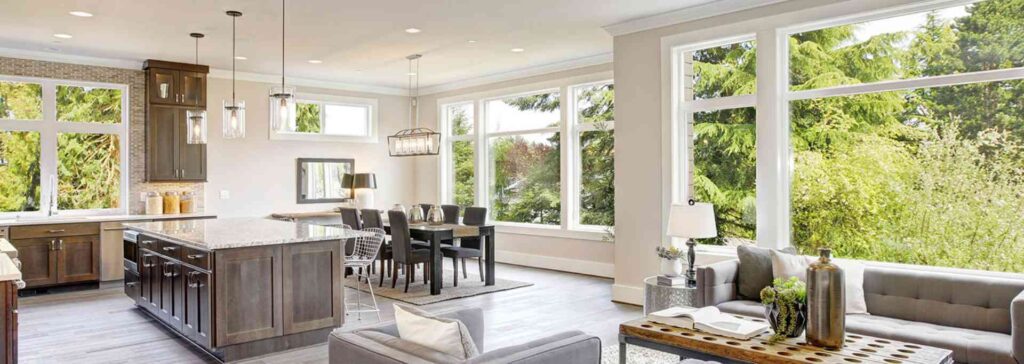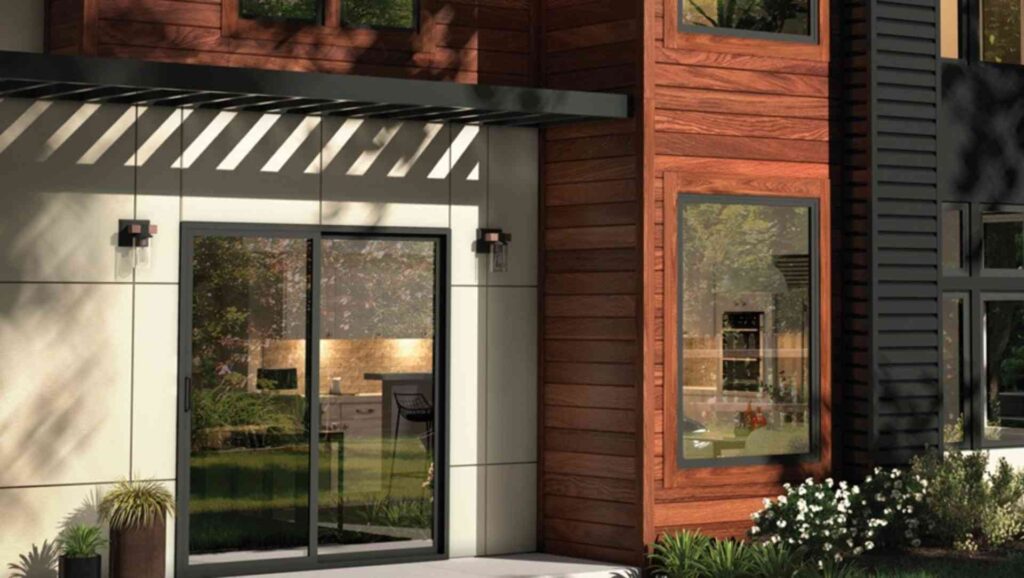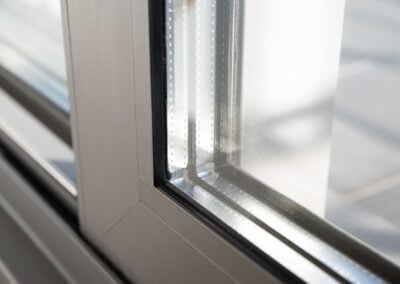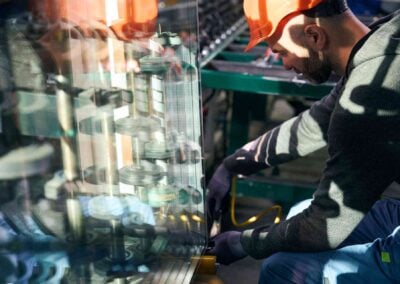Homeowners planning a window replacement project often come across vinyl and composite windows as options. Composite frames are made from a blend of materials, typically wood fibers and plastics, and are promoted as combining the strength of natural wood with the easier upkeep of modern alternatives. While this can sound appealing, it’s worth looking closer at how composites compare to vinyl windows.
Table of Contents
Understanding Composite and Vinyl Window Materials
When comparing window materials, the primary difference lies in how the frames are constructed, as it significantly impacts durability, energy efficiency, and maintenance requirements. Composite and vinyl windows take two very different approaches, and understanding these differences is the first step toward choosing the right product for your home.
Composite Windows
Composite frames are built from a mix of materials, most often wood fibers combined with plastics or resins. This design combines the natural look and structural strength of wood with the lower maintenance of modern engineered materials. Actual performance can vary depending on the manufacturer and the specific formulation used. Some composites may expand or contract with changes in temperature or humidity, particularly in regions with frequent rainfall or extreme temperatures.
Vinyl Windows
Vinyl frames are made from polyvinyl chloride (PVC), a synthetic material engineered for weather resistance and long-term stability. Vinyl windows are manufactured as a uniform product rather than a blend of different materials. They often include insulated internal chambers that enhance energy efficiency, reduce heat transfer, and improve overall durability. Vinyl frames are available in a wide range of colors and finishes designed to suit both traditional and modern homes.
Key Comparisons Between Composite and Vinyl Windows
When researching window frame materials, it helps to understand how each performs in key categories such as cost, durability, energy efficiency, and maintenance. The following overview outlines general characteristics of composite and vinyl windows within each of these areas.
| Factor | Composite Windows | Vinyl Windows |
| Cost | Composite windows are typically positioned in the mid-to-high price range due to their blend of wood fibers and polymers. | Vinyl windows are generally considered a cost-effective material, with pricing that depends on style, features, and brand. |
| Durability | Composite frames are designed for rigidity and strength, performing well when properly manufactured and maintained. | Vinyl frames are engineered to resist moisture and surface corrosion, offering stable performance across a range of climates. |
| Energy efficiency | Energy performance depends on construction quality, glazing, and insulation within the frame. Well-built composites can provide effective thermal control. | Vinyl windows are designed with insulated chambers or optional foam filling that help minimize heat transfer and improve efficiency. |
| Appearance | Composites are valued for their ability to replicate the look and texture of natural wood while offering modern design flexibility. | Vinyl is produced in a wide range of colors, finishes, and styles, including options that simulate wood-grain patterns. |
| Maintenance | Composite materials require minimal maintenance but may need periodic surface cleaning or refinishing if coatings degrade over time. | Vinyl materials are low maintenance and typically retain their finish without the need for painting or refinishing. |
| Availability | Composite products are manufactured by select brands and may be available in fewer color and design variations. | Vinyl windows are widely available and offered in many configurations, sizes, and performance levels. |
| Environmental impact | Many composite products use recycled content or renewable materials, depending on the manufacturer’s production process. | Vinyl windows can incorporate recycled PVC and have long service lives, reducing replacement frequency and material waste. |
| Resale value | The impact on resale value depends on product quality, condition, and regional preferences for specific frame materials. | Vinyl’s effect on resale value varies by market, but modern products are commonly seen as reliable, energy-efficient upgrades. |
| Warranty coverage | Warranty terms for composite windows differ by brand and may depend on factors such as finish, seal integrity, or structural performance. | Vinyl warranties typically address material defects, fading, and workmanship, with duration varying by manufacturer. |
Both composite and vinyl windows have design and performance features that appeal to different homeowner priorities. Understanding how each material performs across these categories helps ensure that window selection is based on suitability for the home, budget, and long-term maintenance preferences.

Schedule a Free Consultation
Get a free home window inspection, talk with one of our design consultants to get product recommendations, and learn about special offers and financing.
Benefits of Composite vs. Vinyl Windows
Both composite and vinyl windows offer advantages that appeal to different types of homeowners. Understanding these benefits side by side makes it easier to see which material best fits your budget, design goals, and specific needs.
| Composite Windows | Vinyl Windows |
| Wood-like appearance: Designed to mimic the appearance of real wood for a more traditional style. | Affordable pricing: Offers excellent value, often costing significantly less than composites or wood alternatives. |
| Sturdy frame feel: Heavier construction gives a more solid impression than entry-level vinyl. | High energy efficiency: Multi-chambered frames provide great insulation to reduce heating and cooling costs. |
| Moderate energy efficiency: Provides decent insulation, depending on construction and design. | Low maintenance: Requires little more than occasional cleaning, with no painting or refinishing needed. |
| Paintability: Some composite frames can be painted for greater customization. | Wide availability: Offered in many styles, colors, and custom sizes. |
| Unique option: Less common than vinyl, which may appeal to homeowners looking for something different. | Proven track record: Decades of use have made vinyl one of the most trusted and reliable window materials. |
| Perceived premium feel: Marketed as a higher-end alternative to standard vinyl. | Exceptional durability: Vinyl’s resistance to moisture and warping makes it a great choice for long-lasting performance. |
Disadvantages of Composite vs Vinyl Windows
While both materials have their strengths, they also come with limitations. Comparing the disadvantages of composite and vinyl windows side by side can help you see which trade-offs matter most for your home.
| Composite Windows | Vinyl Windows |
| Higher cost: Often priced closer to wood or fiberglass without the same proven benefits. | Lower rigidity: May not feel as solid as composites or fiberglass in certain applications. |
| Variable durability: Performance depends on the composite material blend, with some products prone to warping or swelling. | Limited paintability: Vinyl cannot be repainted, so color and finish options must be chosen up front. |
| Maintenance needs: If wood fibers are exposed, frames may require repainting or repairs over time. | Perceived as basic: Some homeowners view vinyl as a standard rather than a premium choice. |
| Limited availability: Fewer manufacturers offer composites, and replacement parts can be harder to source. | Expansion in heat: Vinyl can expand slightly in very high temperatures, though quality brands account for this. |
| Heavier frames: Bulkier construction can limit design flexibility or make installation more difficult. | Color fading: Darker colors may fade over time without proper UV protection from the manufacturer. |
| Inconsistent quality: No standard material blend, so performance can differ widely between brands. | Frame size: Thicker vinyl frames can reduce visible glass area compared to other window materials with a slimmer solid core design. |
Both composite and vinyl windows come with trade-offs. Composites can be heavier, more expensive, and less consistent across manufacturers, while vinyl has limits in paintability, color retention, and overall rigidity compared to premium options. Understanding these drawbacks side by side helps homeowners weigh which factors matter most when choosing the right material for their home.
Why Our Experts Believe Vinyl Windows Are the Smarter Investment
Composite windows can be a good fit for some homeowners. They offer a wood-like appearance and modern performance features that appeal to people who want a traditional look with less upkeep than wood. However, after years of experience, our team has found that vinyl windows consistently meet the needs of our customers better.
Vinyl windows offer dependable performance, energy efficiency, and minimal maintenance at a more accessible price point. Because of this proven reliability, we’ve chosen to focus on high-quality vinyl and fiberglass products rather than composites. This allows us to provide window options we know will hold up to our region’s climate, deliver long-term comfort, and bring lasting value to every home we serve.
Considering Fiberglass Windows as Another Option
For homeowners who want to step up from composite and vinyl, fiberglass replacement windows are often considered the ultimate window frame material. Built from reinforced glass fibers and resins, fiberglass combines strength, stability, and efficiency in a way that few other materials can match.
Fiberglass frames are exceptionally durable, resisting warping, swelling, and fading even in extreme weather conditions. They expand and contract very little with temperature changes, which protects seals, improves energy performance, and extends the life of the window. The material’s rigidity also allows for slimmer frames, giving you more visible glass and natural light without sacrificing strength.
While fiberglass windows come at a higher price point compared to vinyl and composite materials, many homeowners see them as a long-term investment that delivers lasting performance and a premium look. For those seeking the strongest, most weather-resistant, and longest-lasting option on the market, fiberglass stands out as the top choice.
Find the Right Windows for Your Home with Lake Washington Windows & Doors
Choosing the right windows is an investment in your home’s comfort, energy efficiency, and long-term value. While we don’t sell composite frames, our team at Lake Washington Windows & Doors focuses on proven materials that perform exceptionally well in the Pacific Northwest climate.
Our vinyl and fiberglass windows from Milgard and Anlin are designed for lasting performance, strong energy efficiency, and reliable warranties. Vinyl offers an affordable, low-maintenance solution that consistently delivers great results, while fiberglass provides the premium strength and durability many homeowners want for long-term peace of mind.
Every home is unique, and our experienced team is here to help you choose the right fit for your style, budget, and goals. Schedule a complimentary in-home consultation, and we’ll walk you through your options with clear, straightforward recommendations you can trust.




